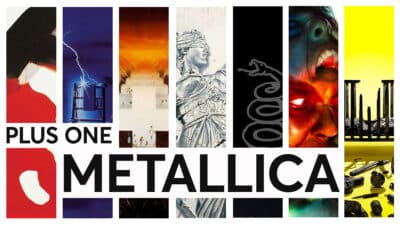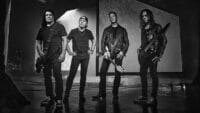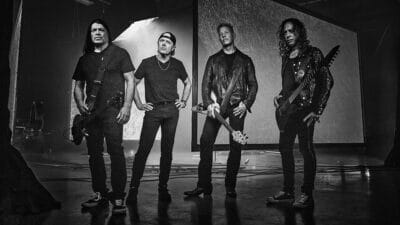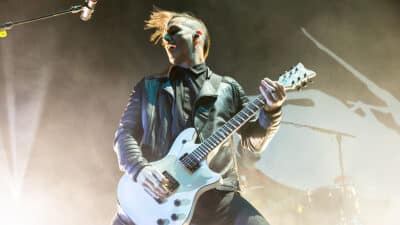Interview

Interview
Jung Jaeil: “Stravinsky and Metallica have the exact same energy”
The composer behind Parasite, Okja and Squid Game talks inspirations ahead of his opening night concert at London’s K-Music festival
When Jung Jaeil was four years old, he was already playing the piano. By nine, he’d taught himself every instrument on Master Of Puppets. Then already obsessed with Mozart, an almost spiritual love of classical music met a passion for thrash head on – landing Jaeil in a professional funk band before he even turned 13, and gifting the Korean pop-scene one of its most uniquely talented prodigies.
And endless string of K-pop hits followed, but Jaeil quickly grew out of writing chart-toppers and turned to classical composition – finding a new home in film and TV where he could be as ambitious and experimental as he knew he needed to be. Three collaborations (and counting) with director Bong Joon-ho later, including work on the Oscar-winning Parasite, Jaeil is now one of the most celebrated names on the international film circuit.
Now preparing to open London’s K-Music festival with a special concert at the Barbican, Jaeil will conduct the London Symphony Orchestra in a celebration of his work – including scores from Parasite, Okja, Squid Game and Broker.
How important are festivals like K-Music for showcasing Korean arts and culture around the world?
They’re hugely important. This festival is introducing many artists that have roots in traditional Korean music, too, which is a beautiful thing. This is the 10th anniversary of the festival too, and I’ve just heard it’s 140th anniversary of the friendship between the UK and Korea. That feels special.
What does tradition mean to you?
I think all art is based on tradition. We have saying in Korean, that “you have to learn a tradition before you can create a new one”. So we all start from there.
What about your own start – you were teaching yourself music from such an early age – where did that passion come from?
My mum gave me a piano lesson when I was four years old. And I hated it. But I loved listened to music, and I just fell in love with ‘Requiem’ by Mozart. I loved very symphonic sounds – I loved the grandeur of an orchestra. And then I just fell in love with heavy metal.
That’s an unusual jump to make.
Well, thrash metal is just as dynamic and powerful as an orchestra. I think Stravinsky and Metallica have the exact same energy. And that fascinated me. I just fell in love with all kinds of music.
What kind of music were you playing when you started out in a band?
Oh it was Metallica, absolutely! We played a lot of thrash. Stuff that sounded a bit like Megadeth maybe. I went into some darker areas, with influences like Carcass and Napalm Death. But then I just came back to tradition again. Led Zeppelin. AC/DC. The Who.
How did get from there to writing music for films?
I actually first had a chance to score a film when I was 15 years old. I just did it to make some money, but I ended up falling in love with film. I became a cinephile. I started getting into European cinema – especially directors like Thodōros Angelopoulos, Andrei Tarkovsky and Bela Tarr. And I became more and more conscious of how important the score really felt to me. It made the film feel alive. By this time I was a little bit tired of making pop music too, so it all happened at the right time.
I had a chance to be a musical director, the main composer, on a film called Sea Fog, which was executive produced by Bong Joon-ho. That was the first film I just started scoring by myself, and that’s when I really fell in love.
A lot of musicians who have made the leap to film talk about how difficult it is to get out of their own way – to be in the service of a story instead of an album – did you find that?
To be honest… no. When I was writing pop music it was always in the service of a client really, so I was never just writing for myself anyway. I released my own solo album 20 years ago, but it completely failed! The challenge I did face, though, was learning the language of film scoring. I had to learn a lot of technical skills that I didn’t have at all.
After Sea Fog you scored Bong Joon-ho’s Okja. Listening back now, that score is still incredibly emotional, but it covers so much other ground too. What was your approach for that film?
It’s a road movie. We go from a very suburban area of Korea, to Seoul, to New York City, to a slaughter house. So I had to really focus on those specific stages, and how they each felt. In the surburbs, I chose to play guitar – a very Ry Cooder kind of acoustic sound. Bong doesn’t like his films to sound like Hollywood, so we went to this awkward, bizarre, funny kind of place for the big chase scene. I came up with this idea of using Balkan gypsy music, and that really seemed to fit. I worked with these beautiful musicians, the Dzambo Agusevi Orchestra from Macedonia, and they brought this very dynamic, powerful, but at the same time, very funny sound.
When we move to New York City, and when we get to the slaughter house, I decided to bring in a lot of electronic elements as well as a choir. But that emotion you mentioned, especially in the final piece, was coming from this very classical, sad piano theme. I wanted something similar to Hayao Miyazaki’s films, hinting at the style of Joe Hisaishi.
This was your second time working with Bong Joon-ho. You went on again to work together on Parasite, and again on the upcoming Mickey 17. What is it about him that makes him such a good creative partner?
First of all, he has a very specific and detailed vision for the music he wants. Sometimes I feel like I’m a musical instrument for him to play – and I respect that very much. But at the same time, he believes in me. He gives a very free space to create. He has his own vision, but he always respects mine. That’s very inspirational for me.
That brings us to Parasite. It’s a film that covers so many different moods and tones – it’s almost like four or five different films in one. Where did you start?
It’s very much four or five films in one, but at same time it was also very simple. I looked at the locations. It was a rich house and a poor house, right? So we needed a very concentrated sound for both. We started searching for those sounds and we came up with these orchestral strings. It was very dynamic but also very sensitive at the same time. Strings are wonderful for expressing that kind of conflict, and you can almost use them sound effects when you want to. Bong mentioned baroque music, which is a little bit elegant and awkward and bizarre at the same time, and that seemed like a perfect fit too. I’m a self-taught composer and I don’t know much about those classical traditions, so I ended up just mixing in everything from Vivaldi to Schubert. I think it worked.
Tension is so key to that film too. Do you enjoy writing for those scenes where the music is used to really keep audiences on the edges of their seats?
Oh, absolutely. I experimented with very modern classical techniques like clusters, and with creating sound effects with traditional instruments alongside electronic drums; mixing old classical elements and modern electronic elements together. I loved working on that film.
You went from there to composing for Squid Game, your first TV show. The scale here was obviously so much bigger than anything you’d worked on before – was that intimidating at all?
I was terrified. My own experience was only ever composing for a two hour long film, and this was nine hours. I had to find one element that would work for every episode, but it had to not be boring. So I started off exploring as many different genres and instruments as possible.
It covers so many different musical styles and it flows almost like a jazz score. How important was improvisation in the process?
In my scores, everything’s based on improvisation. I basically just watch the film and start improvising. I capture it, and then I develop it. That’s always the approach really, but especially so on Squid Game.
Was that why you went so completely in the opposite direction with your next project, your most recent solo album, Listen? It’s so beautifully minimal and restrained compared to the sprawl of Squid Game.
I think so, yeah. Decca approached me and suggested I might want to make something in my own voice. But I had to think about what that might be. What was my own voice? And I found it in front of the piano. That’s where I feel the most comfortable. That is my language. My first language is piano. So yeah, it was very minimal. Very intimate. And then I added strings almost as a companion.
It feels very cinematic still. Do you think that your time spent working on film scores has changed the way that you write music in your own voice?
You know, when I’m scoring, I can hide behind the camera. There’s dialogue and there’s sound effects. But this was just naked music. So I had to record very delicately. I had to mix it very sensitively. That was a big difference, but I think those experiences absolutely fed into it too.
If Listen did have visuals, if it was set to an accompanying film, what would it look like?
Icebergs… melting. In a storm.
Are you looking forward to playing with the London Symphony Orchestra at the Barbican for the K-Music Festival?
Actually, I’ve literally just finished the final mixing for Bong Joon-ho’s next film with the LSO at Abbey Road Studios. They were just impeccable. I was speechless. It’s a mix of orchestra and piano, and I’m so glad that the piano is so important for that film. I have no idea if I’m allowed to say anything else about it…
What are you mostly listening to now if it’s not Metallica and Mozart anymore?
One of my heroes just passed away earlier this year actually. His name was Ryuichi Sakamoto. I’ve been listening to his music a lot recently – especially a song called ‘andata’, from his album Async. I met him once, and I confessed I would like to listen to that song when I close my eyes. I’ve been listening to it so many times.
Jung Jaeil opens London’s K-Music festival at The Barbican on 1 October. Find tickets here.









